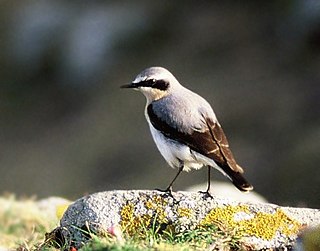
The wheatears are passerine birds of the genus Oenanthe. They were formerly considered to be members of the thrush family, Turdidae, but are now more commonly placed in the flycatcher family, Muscicapidae. This is an Old World group, but the northern wheatear has established a foothold in eastern Canada and Greenland and in western Canada and Alaska.

The Old World flycatchers are a large family, the Muscicapidae, of small passerine birds restricted to the Old World, with the exception of several vagrants and two species, bluethroat and northern wheatear, found also in North America. These are mainly small arboreal insectivores, many of which, as the name implies, take their prey on the wing. The family is relatively large and includes 357 species, which are divided into 54 genera.
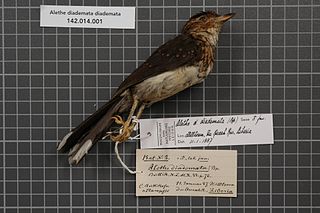
Alethe is a genus of small mainly insectivorous birds in the Old World flycatcher family Muscicapidae that occur in West Africa.
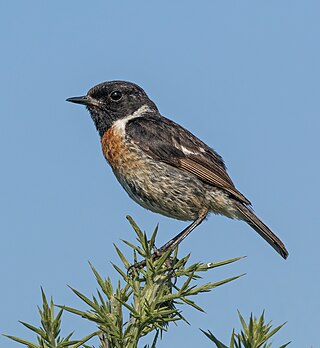
Saxicola, the stonechats or chats, is a genus of 15 species of small passerine birds restricted to the Old World. They are insectivores occurring in open scrubland and grassland with scattered small shrubs.

The blackstart is a chat found in desert regions in North Africa, the Middle East and the Arabian Peninsula. It is resident throughout its range.

The mountain wheatear or mountain chat is a small insectivorous passerine bird that is endemic to southwestern Africa.
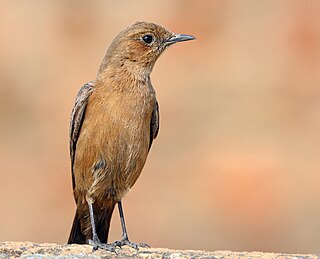
The brown rock chat or Indian chat is a bird species of the family Muscicapidae. It is found mainly in northern and central India. It is often found on old buildings and rocky areas. It resembles a female Indian robin but lacks the reddish vent and differs in posture and behaviour apart from being larger. In flight it bears some resemblance to thrushes and redstarts. It feeds on insects, captured mainly on the ground. It was formerly placed as the sole species in the genus Cercomela but is now included with the wheatears in the genus Oenanthe.
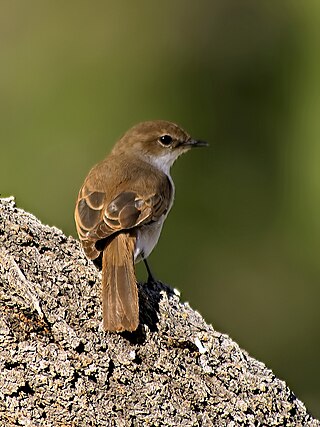
Bradornis is a genus of small passerine birds in the large family Muscicapidae commonly known as the Old World flycatchers. They are restricted to sub-Saharan Africa.

The familiar chat is a small passerine bird of the Old World flycatcher family Muscicapidae. It is a common resident breeder in Africa south of the Sahara in rocky and mountainous habitat and around human habitation.

The tractrac chat is a small passerine bird of the Old World flycatcher family Muscicapidae. It is a common resident breeder in southernmost Angola, western Namibia and western South Africa.

The Karoo chat is a small passerine bird of the Old World flycatcher family Muscicapidae. It is a common resident breeder in southwesternmost Angola, western Namibia and western South Africa. Its habitat is Karoo and desert scrub in the south, extending to the escarpment zone in the north.

The sickle-winged chat or sicklewing chat is a small passerine bird of the Old World flycatcher family Muscicapidae endemic to southern Africa. It is a common resident breeder in South Africa and Lesotho, and is also found in southernmost areas of Botswana and Namibia. Its habitat is Karoo scrub, short grassland, and barren sandy or stony areas. In western coastal areas, it also occurs on agricultural land.

The moorland chat, also known as the alpine chat or hill chat, is a species of songbird in the Old World flycatcher family. It is endemic to north-east Africa where it is common in its habitat. It lives at high altitudes on moors and grassland, usually above 3,400 m (11,100 ft), but can live as low as 2,100 m (6,900 ft). It has a short tail and long legs. It is bold and will approach people.

The chat flycatcher is a small passerine bird in the Old World flycatcher family Muscicapidae that is native to southern Africa.

The Marico flycatcher or Mariqua flycatcher is a passerine bird in the Old World flycatcher family Muscicapidae that is found in areas of southern Africa.
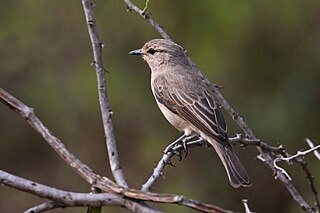
The African grey flycatcher, grayish flycatcher, or large flycatcher is a passerine bird in the Old World flycatcher family Muscicapidae that occurs in parts of East Africa.

The pale flycatcher is a passerine bird of the Old World flycatcher family Muscicapidae, found in Sub-Saharan Africa.
The sombre rock chat is a species of passerine bird in the family Muscicapidae. It is found in Ethiopia and Somalia. Its natural habitat is subtropical or tropical dry shrubland.
The brown-tailed rock chat is a species of bird in the family Muscicapidae. It is found in Chad, Eritrea, Ethiopia, Kenya, Somalia, Sudan, and Uganda. Its natural habitats are dry savanna and subtropical or tropical dry shrubland.
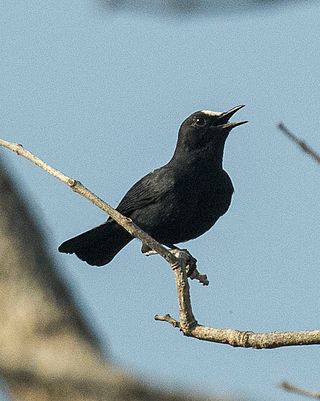
The white-fronted black chat is a species of passerine bird in the family Muscicapidae. It is found in Benin, Burkina Faso, Cameroon, Central African Republic, Chad, Democratic Republic of the Congo, Ivory Coast, Eritrea, Ethiopia, Gambia, Ghana, Guinea, Guinea-Bissau, Mali, Mauritania, Niger, Nigeria, Senegal, Sierra Leone, South Sudan, Togo, and Uganda. Its natural habitats are moist savanna and subtropical or tropical dry shrubland.

















